
Cernavoda: Black water. A former Roman outpost, has become sadly famous for the death channel digged from here to Constanta. One of the many channels built upon order of Ceausescu, to cut 300 km of Danube that turns north before bending east again in Black Sea. Cernavoda – Chernobyl, same black root. Also in Cernavoda there is a nuclear plant.
With all that energy did they need nuclear power too?
In a boiling hot bar, I see a hairy waitress and many men proudly showing their belly: A place so ugly that’s nearly touching. Only the stray dogs bring some gentleness in this sunny square, full of gross people who loudly accelerate and brake. I don’t judge anyone but this place is horrible.
I just hope to get away as soon as possible. However a very kind gentleman has told us where we could moor and another one, Rado (a Viking who’s chosen this no-place to live on a barge), allows us to stay.
But what am i doing here? First of all, the Danube is flowing under me: I’ve arrived here by rowing, sailing and, last but not least, a lift from Captain Florian. By the way we’ve covered 4.200 km from Wargrave, UK, in April 2010.
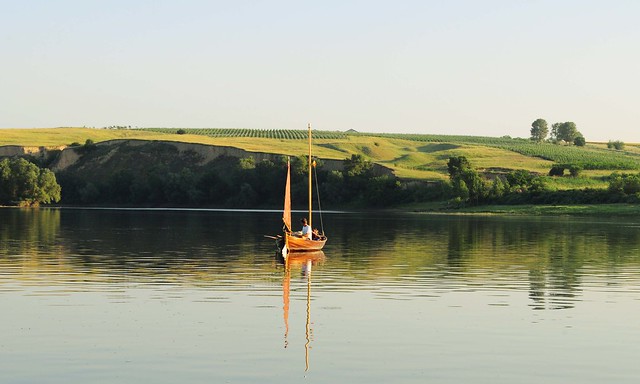
And here, shortly, I’ll be joined by Nicola and Tommaso. In the four and a half hour waiting, I watch the barges manoeuvreing, the oldest Danube’s iron bridge (1895), the hairs of the hairy woman and the bellies of the big-bellied men.
I haven’t seen the city, maybe it’s nice. But I can’t cope with this heat.
Eventually Nicola and Tommaso arrive and we set off. They’re light and I appreciate it. Light in luggage and life, having mind and sensibility. Nicola was an essential part of the project and it’s thank to him if Clodia was built in Lago. To him and to Nicola Baggio who introduced him to me. Then many others have put in as much effort, but they came later. I have a great debt of gratitude with the two Nicola. I barely know Tommaso, I know he’s a cultural amplifier. He amplifies projects, ideas. The mind thinks but can’t shout.
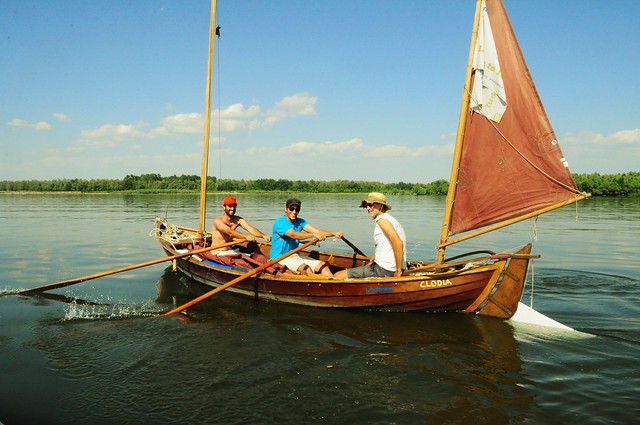
Along with other friends, they’ve founded Sharazad, a nice lab and factory of ideas and facts. Res non verba.
We set off and very soon Tommaso the tactician, who’s been world champion in some sailing class, finds the way to navigate by sail where I would have probably used the oars. The scenery is beautiful: Hills, cliffs, and in front of us a green, blue and red sunset.
 There’s mud everywhere on the river banks, so we have to set our camp under a little cliff. I see shards, bricks and chips that look Roman. And Roman they are.
There’s mud everywhere on the river banks, so we have to set our camp under a little cliff. I see shards, bricks and chips that look Roman. And Roman they are.
It’s a beach made of shards, some of them wonderful. You can still see the fingerprints over the bricks, the crockery, some round stones. Same mud, same clay.
I see a stone pillar collapsed over an opus incertum, a mix of volcanic ash and rocks that Romans used to fill walls or foundations. And opus mixtum. Then, a few stones looking like being part of an ancient harbour. The river here is quite deep right up to the bank, perfect to build a port. Nicola and Tommaso discover a fortress with a little museum inside.

Fire, so many mosquitoes, mud. A frugal dinner and straight to bed under a fantastic sunset. In the morning Anna takes some nice shots from the fortress, then at 6 o’clock we get moving. Still wonderful landscapes, cliffs, a Lipovan cross, Lipovan boats, Lipovan churches. What about Lipovans? Russians, Vikings on the amber road, chased away 300 years ago by the Russian Tsar. They’ve found a refuge here, a place offering something to live with.
They’re different: Very strong and many of them blue eyed. Their boats are black, Viking, so clearly Viking with a double stern. And they still row, not carrying any motor aboard. It’s such a pleasure to watch them rowing faster than me. I stop to see one of them, it’s wonderful. Straight lines, black of real pitch.

Do you remember the town of Calafat on the Danube? Even today in Italian we say “Calafatare”, meaning “to caulk”, the planking. The rowlocks are made of a single tolepine. Perfect. These boats draught little and carry a lot. Classic planking, not clinker as the Viking boats, strange. I get to know that in Braila still exists a master shipwright. I’ll look for him, in vain.
Let’s go, still sailing. We stop for lunch in Harshova or Hirshova. The golden church looks like a 17th century spanish sugar bowl. On the pontoon we meet Adriano who’s fishing: He’s a nice young man speaking Italian. He tells us that’s safe to leave the boat.
How rocky here! Limestone, looks like Croatia. In a hot city we get approached by two funny rascals, 10 and 12 years old. Real pests. But I talk to them and the oldest climbs a tree to pick some sweet apricots for me. Just a minute before, a guy passing by had slapped him without any apparent reason. Life is not kind to them. At home probably things are not going the way they should. Barefoot and skinny. Strong and already adult. Smart. They should run away from here, the risk of going to jail as soon as they grow up is high.
I buy them a slice of pizza. They’re happy and, after making a few more troubles, take their way home by greeting us. The oldest litters the carton on the street and throws the drink bottle inside a pharmacy. A street that doesn’t want him and a pharmacy that, maybe, doesn’t want to heal him. Tzigane, gypsy, romany. The stantial don’t want them. Nomads and stantials: It doesn’t go smoothly.
I’m a bit nomad and sometimes people stare badly at me. I smell, I’m dirty. My shoes have holes. But you can tell that I’m not a true nomad. I’ve been lucky. A matter of chance.
Pizza is tasty for us too. Tommaso wishes to watch the soccer game, so we try to find a friend of a friend, Vasile Antip, who works in Torino. He has sailed along the Danube and the Black Sea and wrote me many e-mails full of help and suggestions. I call “Midica” Karpov who lives close to here. He immediately does his best to help, inviting us in his place to watch the game. He lives in Braila but works as a ranger in the big island, a natural reserve, planting trees. We go: Great Vasile and Midica too!

We’re 25 km away and they’re not an easy task: At first headwind, then flatwind in a secondary branch of the river. A paradise. Wild horses, porks, storks, herons and fishes. The houses’ roofs are made of faggots. A strong wind comes when we’re 3 km from Midica’s house. Nicola is at the tiller: It’s his first time, so he’s obviously inexperienced. My mistake. Clodia is veering, then stops: Not a good sign. We’re helpless. I see the gust coming. Lonely, isolated, strange. Shit happens. I just have the time to say: “We’re in danger”. But I know that we’re going down.
Tommaso, as an expert sailor, quickly throws himself windward. I’m slower. He saves us from a full capsize. I free the spanker but it’s not enough. Clodia slants just enough to allow about two square metres of water to get in. Be water, I always say. We truly are, now. Clodia is full of warm water, up to 5 cm from the gunwhale. Everything is under water. Everything!
I immediately ask Tommaso to get aboard Serena, that Leon has driven close, and with Nicola at the pump (so useful, thanks to Emilio from Chioggia) begin to bail the water out. I use a bucket. The British, great sailors, say that you cant’ find a better pump than a bucket and a man who fears to sink. Clodia doesn’t sink since it’s made of wood, but going under water would mean loosing things and having a boat unmanageable. In 10 minutes Clodia is nearly empty.
 I keep rowing and shortly meet Midica. I load all the wet stuff on his pick-up and he drives us across an old fashion scenery. Horse-drawn carriages, veiled women, country houses with gardens. Free hemp, that people don’t smoke but weave, and cows, gooses, goats, many fruits and a simple life. Arcadia felix?
I keep rowing and shortly meet Midica. I load all the wet stuff on his pick-up and he drives us across an old fashion scenery. Horse-drawn carriages, veiled women, country houses with gardens. Free hemp, that people don’t smoke but weave, and cows, gooses, goats, many fruits and a simple life. Arcadia felix?
Midica offers a dinner spaghetti based, that we buy in a 100 years old shop: In 20 square metres you can find everything! Reliable and peaceful people. Nicola cooks. The dinner is wonderful: Fresh cheese, just milked milk, tomatoes. I’ve hanged all my stuff over a cherry tree and some vines. It’s soaked, even the sleeping bag. I sleep in a roulotte: Rather than sleeping, I fall dead! 55 km and the quick bailing have worn me out.
At 6 in the morning is time to set off, after a good coffee offered by friendly hands. Nicola and Tommaso head to Braila with Midica, while I hang the still wet clothes on Clodia and start rowing. I’m ridiculous: Now you know why it’s so useful to have a two-masts boat!
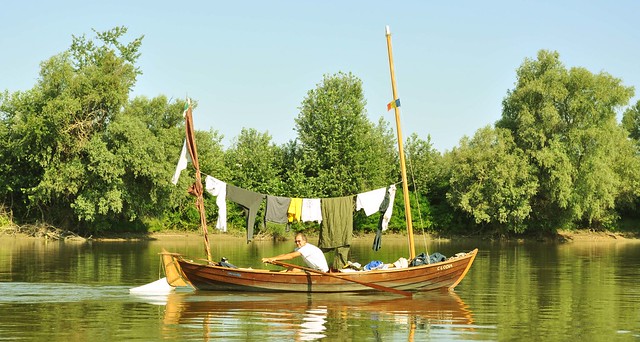
After 40 km I meet two young kayakers: Norman and Nina, friends of Andy, Thomas and Elly.
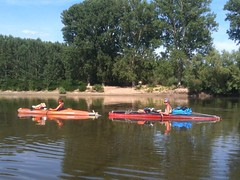 We row until Braila and after 57 km I join Midica once again: He’s managed to find free mooring for us. In the Baza Nautica of Braila we don’t have to pay and they’re so nice. Quick dinner and a deep sleep. What a day!
We row until Braila and after 57 km I join Midica once again: He’s managed to find free mooring for us. In the Baza Nautica of Braila we don’t have to pay and they’re so nice. Quick dinner and a deep sleep. What a day!
Braila is quite beautiful. It used to be the largest fluvial trading port in Romania. Here, as in Dobreta Turnu Severin, merchants from all around the world made lots of money and built houses in Italian and Parisian fashion: Art Nouveau, Chippendale, so much more. The theatre, dedicated to Maria Filotti, is wonderful. Then, the Rally (another theatre) and the philarmonic Lira. A little Paris on the Danube.

The paving stones speak about money. Granite from the Ural mountains, porphyry, basalt, pink granite. They costed an arm and a leg. I see shutters built in Munich, the palace of the Generali (from 1892), a magnificent aqueduct-restaurant. At Octavia and her sister’s house, we find a great surprise: The Turkish catacombs. It’s so cold down there.
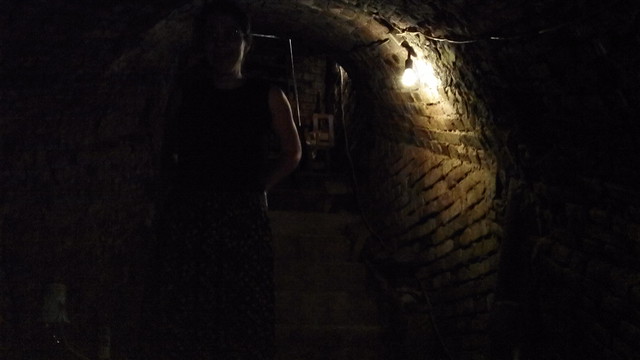
Octavia is a genial artist, following the footprints of her dad who used to employ 40 people in his workshop, stuffed with lathes and milling-cutters that would be a pleasure for enthusiasts.
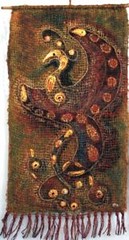 Now they’re about to open a B&B and it’ll be a success: A magical place.
Now they’re about to open a B&B and it’ll be a success: A magical place.
I get to know Rado Masei, the director of the reserve in Braila’s big island. 60 by 25 km, 85.000 hectars. There’s a Ceausescu house too, but he never managed to see it since he was killed. Midica and his wife, who’s Lipovan, lived inside it for a while.
She tells us about the victim in 1989, the silence and the too loud worlds spoken today. About a world that’s changed too fast, where someone can’t find his place. Me neither.
Such great friends. Such big hearts!
 In Braila I also meet an orthodox Lipovan priest, very nice, who gives me a magic cross and some pictures of an ikon of St. John, made of clay, that’s reported to have been cried myyrh in 2009. I share some opinion on the rich church, and he understands. What would Christ do with the rich churches, should he make his comeback? Would he sell them to the rich? Would he give them to the poor? Bomber? Indignado? And what about the Vatican? He spreads his arms.
In Braila I also meet an orthodox Lipovan priest, very nice, who gives me a magic cross and some pictures of an ikon of St. John, made of clay, that’s reported to have been cried myyrh in 2009. I share some opinion on the rich church, and he understands. What would Christ do with the rich churches, should he make his comeback? Would he sell them to the rich? Would he give them to the poor? Bomber? Indignado? And what about the Vatican? He spreads his arms.
To me, my church is nature. Very rich but in a different way. The gold is underground, hidden. The true beauty loves to hide.
“Laudato si’, mi’ Signore, per sor’aqua, la quale è multo utile et humile et pretiosa et casta.”
(Praised be You, my Lord, through sister Water, so useful, humble, precious and pure).
It’s a part of Canticle of the Creatures by St. Francis of Assisi.
Be water my Friends, be water.
But don’t overdo it!
























Thalatta, thalatta !!!
Sea again !
Di nuovo! E i mari sono fatti di fiumi. Anche.
Un abbraccio
Anche tu hai portato qui Clodia, lo sai.